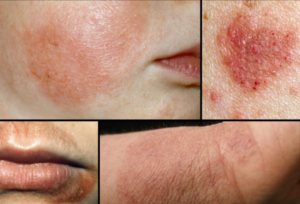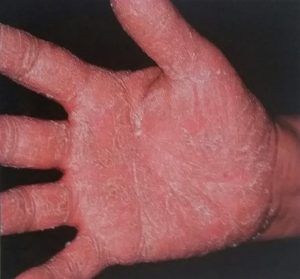ECZEMA
Eczema is a general term encompassing various inflamed skin conditions. One of the most common forms of eczema is atopic dermatitis (or “atopic eczema”). Approximately 10 to 20 percent of the world population is affected by this chronic, relapsing, and very itchy rash at some point during childhood. Fortunately, many children with eczema find that the disease clears and often disappears with age.
In general, atopic dermatitis will come and go, often based on external factors. Although its cause is unknown, the condition appears to be an abnormal response of the body’s immune system. In people with eczema, the inflammatory response to irritating substances overacts, causing itching and scratching. Eczema is not contagious and, like many diseases, currently cannot be cured. However, for most patients, Dr. Green helps manage the condition with several different treatments and avoidance of triggers.

Eczema Treatment
Dr. Green Eczema Treatment Dr. Green offers a revolutionary treatment called XTRAC. XTRAC is the only FDA-cleared, clinically proven excimer laser that gets skin clear of psoriasis, atopic dermatitis (Eczema), as well as vitiligo—and it works fast, with many patients seeing significant improvement and long-lasting remissions. Because XTRAC delivers a highly targeted, therapeutic beam of UVB light only to areas of affected skin, healthy skin surrounding the lesions stays that way. XTRAC clears the symptoms, prolongs the remission and returns skin to a clinically healthy state in record time. All of this means XTRAC delivers consistently predictable results so patients experience fewer recurrences.
Quick Facts
-
Effective treatment—symptoms reduced generally in 10-12 treatment sessions
-
Long-lasting relief—typically several months free of symptoms” Simple, painless treatment—sessions are very short
-
Relief without messy creams and daily skin care regimen
-
Covered by most major insurance companies, available by Rx
What does eczema look and feel like?
Although eczema may look different from person to person, it is usually characterized by dry, red, extremely itchy patches on the skin. Eczema is sometimes referred to as “the itch that rashes,” since the itch, when scratched, results in the appearance of the rash.
Eczema can occur on just about any part of the body; however, in infants, eczema typically occurs on the forehead, cheeks, forearms, legs, scalp, and neck. In children and adults, eczema typically occurs on the face, neck, and the insides of the elbows, knees, and ankles. In some people, eczema may “bubble up” and ooze. In others, the condition may appear more scaly, dry, and red. Chronic scratching causes the skin to take on a leathery texture because the skin thickens (lichenification).
What makes patients with eczema itch?
Many substances have been identified as itch “triggers” in patients with eczema, and triggers are not the same for every person. Many times it is difficult to identify the exact trigger that causes a “flare-up”. For some, it seems that rough or coarse materials coming into contact with the skin causes itchiness. For others, feeling too hot and/or sweating will cause an outbreak. Other people find that certain soaps, detergents, disinfectants, contact with juices from fresh fruits and meats, dust mites, and animal saliva and danders may trigger itching. Upper respiratory infections (caused by viruses) may also be triggers. Stress can also sometimes aggravate an existing flare-up.

Who gets eczema?
Eczema occurs in both children and adults but usually appears during infancy. Although there is no known cause for the disease, it often affects people with a family history of allergies.
Moisturizers, Soaps, and Detergents
It is very important that people with Eczema take extra efforts to keep their bodies moist. Eczema causes the skin to become drier than normal. The drier the skin gets, the “itchier it gets” and then the desire to scratch follows perpetuating a very bad “itch-scratch” cycle. Some of Dr. Green’s recommendations are:
-
Use a gentle, moisturizing soap (ie. Dove Sensitive skin, Basis, or Cetaphil)
-
Use “Chemical Free” laundry detergent (ie. All Chemical Free)
-
Frequently use moisturizers (ie. TriXera, Cetaphil, or Cerave)



